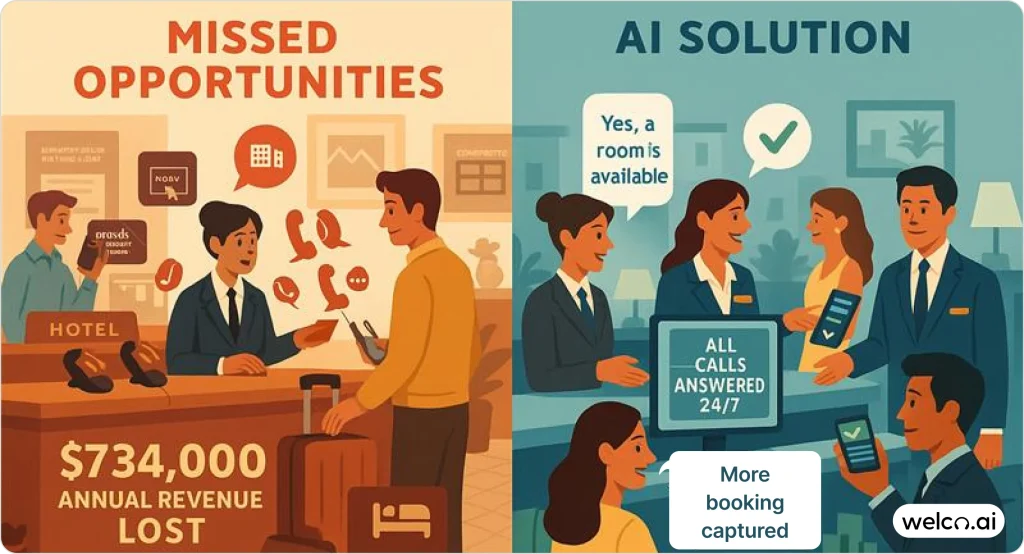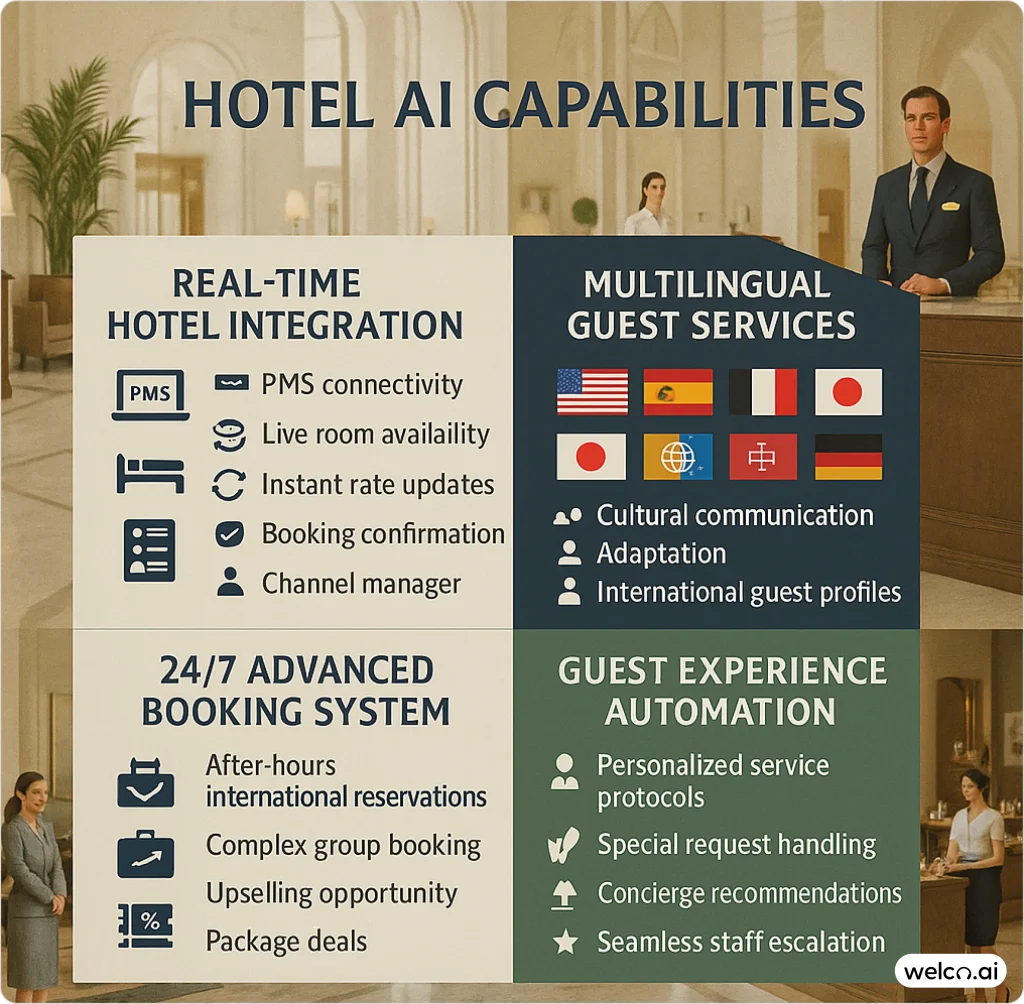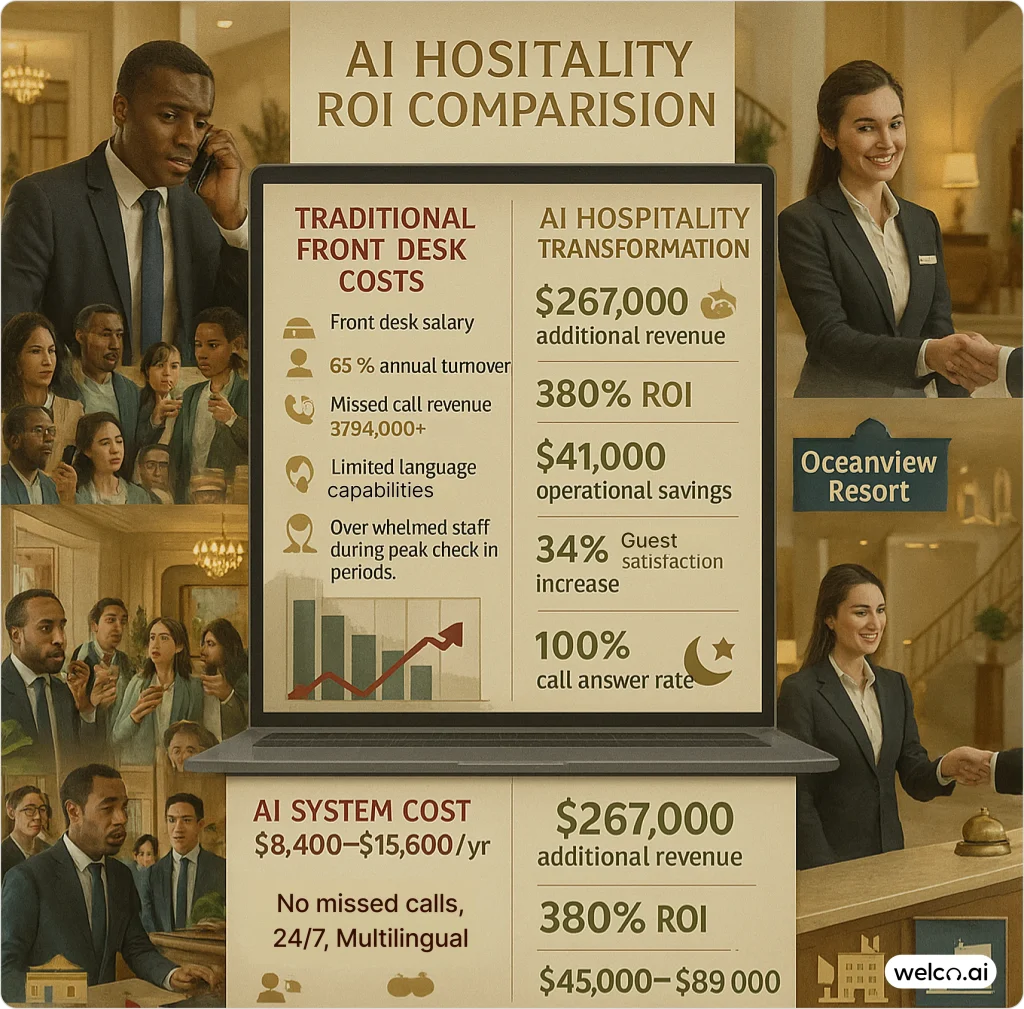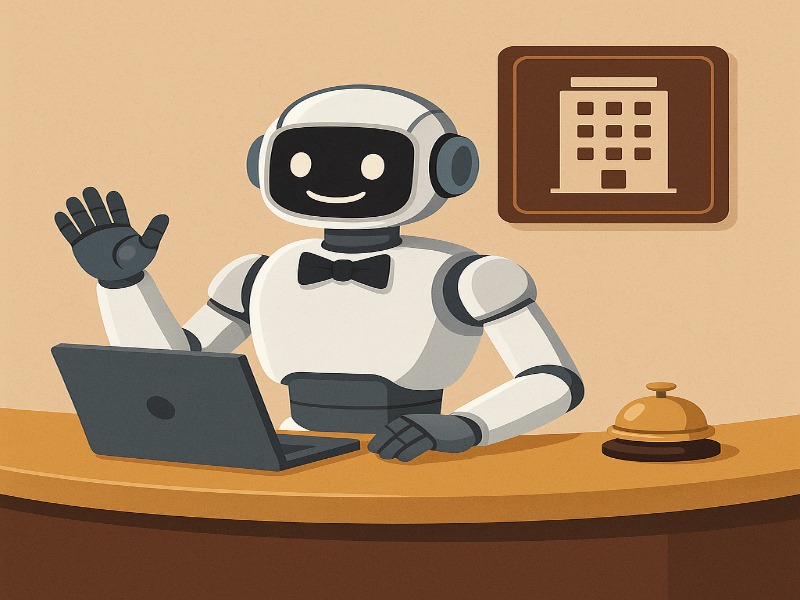The Evolution of Hotel Guest Services: Why AI Hotel Reception Matters
The hospitality industry has undergone dramatic transformation over the past decade. While digital booking platforms have revolutionized how guests make reservations, phone support remains the cornerstone of exceptional guest service and direct booking capture.
According to STR Global’s 2024 Hotel Technology Report, 73% of guests still prefer calling hotels directly for complex requests, special accommodations, and personalized service inquiries. This makes AI hotel receptionist systems and hotel reception automation more critical than ever for maintaining competitive advantage.
The Real Cost of Missed Calls in Hospitality
Industry research from the American Hotel & Lodging Association reveals concerning statistics about hotel phone management and the growing need for hotel guest services AI:
- 67% of hotels miss calls during peak periods
- Average revenue loss per missed call: $340
- Staff turnover in front desk roles: 65% annually
- Guest satisfaction drops 31% when calls go unanswered
The Oceanview Resort in Florida discovered this impact firsthand when they tracked their call performance for one month. The results were startling: 180 missed calls translated to approximately $61,200 in lost bookings. Extrapolated annually, this represented over $734,000 in missed revenue opportunities.
“We never realized how much revenue was walking away simply because our front desk was overwhelmed during check-in rushes,” explains Maria Santos, General Manager at Oceanview Resort. “The math was sobering, and we knew we needed a hotel missed calls solution.

Industry Insight: During peak seasons, hotels experience 300% increases in call volume, but staffing typically increases by only 20%. (Source: Hospitality Technology Magazine, 2024)
How Modern Hotels Are Adapting with Smart Hotel Technology
Leading hospitality properties understand that guest service isn’t just about problem-solving – it’s about creating seamless experiences that drive direct bookings and build loyalty.
According to AHLA’s 2024 Technology Adoption Survey, successful hotels are implementing AI-powered guest service automation that ensures consistent service quality whether guests call at 2 AM or during the busiest check-in periods. This represents a significant shift toward hotel digital transformation AI strategies.
The Traditional Front Desk Challenge
Traditional human-only reception models face several operational challenges in today’s hotel environment:
Financial Burden:
- Base salary for front desk staff: $32,000-$45,000 annually
- Benefits and training costs: $12,000-$18,000 annually
- Turnover replacement costs: $8,000-$15,000 annually
- Total annual cost per position: $52,000-$78,000
Operational Limitations:
- Cannot handle multiple simultaneous calls
- Limited to business hours without overtime costs
- Requires constant training on rates, packages, and policies
- Inconsistent service quality during high-stress periods
- Language barriers with international guests
Guest Experience Challenges:
- Long hold times during peak periods
- Inconsistent information across different staff members
- Limited after-hours service capabilities
- Difficulty managing complex group bookings
These challenges highlight why many properties are exploring virtual hotel receptionist solutions and hotel labor cost reduction strategies.
The AI Solution: Transforming Hotel Guest Services
Modern AI-powered hotel front desk AI systems address these challenges while enhancing the overall guest experience. These systems integrate seamlessly with existing hotel infrastructure to provide comprehensive support across all guest touchpoints.
Oceanview Resort’s Transformation: A Case Study
After dealing with overwhelming call volumes during the 2023 holiday season, Oceanview Resort implemented an AI hotel receptionist system in January 2024.
“I was concerned about maintaining our personal touch,” admits Maria Santos. “But the results spoke for themselves within weeks.”
Month 1 Results:
- Call answer rate improved from 65% to 100%
- After-hours bookings captured: $18,400
- Guest complaints about phone service: Down 78%
- Staff stress levels significantly reduced
- Front desk team could focus on in-person guest relationships
6-Month Results:
- Additional revenue generated: $267,000
- Operational cost savings: $41,000
- Guest satisfaction scores increased by 34%
- Total ROI: 380%
“The transformation has been remarkable,” Maria explains. “Our AI handles routine inquiries perfectly, allowing our team to focus on creating memorable experiences for guests who need personalized attention. We’re capturing international bookings at 3 AM while our staff sleeps, and guests appreciate getting instant, accurate information about amenities and availability.”
One unexpected benefit: The AI system revealed gaps in their standard operating procedures, forcing them to streamline their guest service protocols. “It made us more efficient across the board,” Santos notes.
Key Features That Drive Results in Hospitality
Real-Time Integration with Hotel Systems
Unlike generic call systems, hospitality-specific AI solutions integrate directly with property management systems (PMS), channel managers, and revenue management platforms. This ensures guests receive accurate room availability, rates, and booking confirmations instantly.
Multilingual Guest Services
Modern hospitality AI systems support 40+ languages with cultural awareness, adapting communication styles for different guest demographics. Business travelers receive formal, efficient service while leisure guests get friendly, detailed assistance with local recommendations.
Advanced Booking Capabilities
These systems can:
- Process direct bookings with instant confirmation
- Handle complex group reservations
- Manage cancellations and modifications
- Upsell room categories and packages
- Coordinate special requests and amenities
24/7 Guest Support
Round-the-clock availability captures late-night international bookings, handles emergency guest requests, and provides consistent service quality regardless of staffing limitations.
Similar comprehensive guest service automation is being adopted across related hospitality sectors, with small businesses implementing AI reception systems to compete with larger properties on service quality.

Industry Implementation Trends
Current Adoption Landscape
According to Hospitality Technology’s 2024 Industry Survey, 82% of hotel companies are either using AI or running pilot programs for guest services. Early adopters of hotel AI operations report significant advantages in:
- Guest satisfaction scores (average increase of 28%)
- Operational efficiency (43% reduction in routine call handling time)
- Revenue capture (31% increase in direct bookings)
- Staff productivity (staff focus shifted to high-value guest interactions)
- Competitive positioning (differentiation through superior service availability)
“Hotels that implemented AI guest services in 2023 are seeing the most dramatic competitive advantages,” notes Dr. Sarah Chen, Hospitality Technology Analyst at STR Global. “They’ve optimized their operations and can now offer service levels that were previously impossible with traditional staffing models.”
This trend extends beyond hospitality, with healthcare practices implementing HIPAA-compliant AI reception and professional services firms streamlining client intake processes, demonstrating the broad applicability of AI reception solutions across service industries.
Best Practices for Implementation
Phase 1: Foundation (Weeks 1-2)
- Connect to existing phone systems
- Upload property information and room inventory
- Configure basic guest inquiry responses
- Test with limited call volumes
Phase 2: Integration (Weeks 3-4)
- Integrate with PMS and channel management systems
- Configure real-time rate and availability sync
- Set up guest recognition and history access
- Train AI on property-specific amenities and policies
Phase 3: Optimization (Weeks 5-8)
- Launch full 24/7 coverage
- Monitor performance metrics and guest feedback
- Fine-tune responses based on actual interactions
- Train staff on new workflows and escalation procedures
This hotel AI implementation guide ensures smooth adoption while maximizing the benefits of intelligent guest service automation.
The Economics of AI Implementation
Cost-Benefit Analysis
| Traditional Reception | AI Reception Solution |
| Annual Cost: $52,000-$78,000 | Annual Cost: $8,400-$15,600 |
| Limited to business hours | 24/7 coverage with unlimited capacity |
| Single-language capability | Multilingual guest services |
| Inconsistent service quality | Consistent, high-quality interactions |
| Net Savings: $36,000-$62,400 annually |
Revenue Enhancement Opportunities
Beyond cost savings, AI implementation typically generates additional revenue through:
- After-hours international bookings: $45,000-$89,000 annually
- Improved direct booking conversion: $32,000-$67,000 annually
- Upselling and package optimization: $18,000-$34,000 annually
- Reduced no-show rates through better communication: $12,000-$23,000 annually
Total First-Year Impact: $143,000-$275,400

This combination of cost savings and revenue enhancement explains why hotels consistently report strong ROI within the first year.
The economic benefits mirror results seen across other service industries, where retail and e-commerce businesses have discovered similar operational efficiencies and revenue capture opportunities through AI reception implementation. Many properties find that hotel cost savings AI solutions deliver measurable results within the first quarter of deployment.
Implementation Roadmap for Hotels
Immediate Assessment Steps
1. Evaluate Current Phone Performance
- Track missed calls during peak periods
- Calculate potential revenue loss
- Identify busiest call times and common inquiries
- Assess current guest satisfaction with phone service
2. Define Integration Requirements
- List current systems (PMS, channel manager, CRM)
- Identify guest data sources and booking workflows
- Determine success metrics and ROI targets
- Plan staff training and change management
3. Pilot Program Strategy
- Start with after-hours and overflow call handling
- Gradually expand to full guest service capabilities
- Monitor guest feedback and system performance
- Scale based on proven results
Success Factors
- Choose solutions designed specifically for hospitality operations
- Ensure seamless integration with existing hotel technology stack
- Maintain transparency with guests about AI assistance options
- Continuously optimize based on guest feedback and performance data
- Train staff to handle complex requests that require human expertise
The implementation approach varies by property type and guest demographics. While full-service hotels focus on comprehensive guest service automation, boutique properties often emphasize personalized touches that complement AI efficiency.
Industries with complex compliance requirements, such as legal firms managing confidential call handling and financial services implementing compliance-focused reception, have developed specialized approaches that balance automation with regulatory obligations.
Future Trends in Hospitality AI
Emerging Capabilities
The future of hotel guest services will likely include:
- Predictive guest service based on historical preferences
- Advanced sentiment analysis for proactive issue resolution
- Integration with IoT devices for seamless room management
- Voice-activated concierge services in guest rooms
Competitive Landscape Evolution
As AI adoption accelerates, properties that delay implementation may face:
- Increased operational costs relative to competitors
- Reduced ability to capture direct bookings
- Guests with elevated service expectations set by AI-enhanced competitors
- Difficulty attracting and retaining quality staff
Conclusion: The Strategic Imperative for Hotels
The hospitality landscape continues evolving rapidly, with guest expectations for instant, accurate, and personalized service across all touchpoints. AI-powered hotel reception automation represents more than operational efficiency – they’re strategic investments in guest experience, revenue optimization, and competitive positioning.
Properties like Oceanview Resort demonstrate that successful implementation doesn’t require massive technology overhauls. With proper planning and the right AI hotel receptionist systems, hotels can transform their guest service operations within weeks while seeing measurable ROI within months.
The question isn’t whether AI will transform hotel guest services – it’s whether your property will lead or follow in this transformation.
Ready to explore how AI can enhance your hotel’s guest services? Discover how hospitality industry reception solutions can optimize your operations with a personalized assessment that addresses your specific property needs and guest demographics.
Frequently Asked Questions
How does hospitality AI differ from generic phone systems?
Hospitality AI integrates with property management systems, understands hotel terminology, handles complex bookings, and supports 40+ languages with cultural awareness. Unlike generic systems, it’s built specifically for guest service optimization and revenue management, with features like dynamic pricing integration and guest recognition.
Will AI replace our front desk staff?
No. AI handles 70-80% of routine inquiries so your team can focus on creating memorable guest experiences. Hotels report improved staff satisfaction as employees engage in more meaningful guest interactions. AI serves as an advanced assistant, not a replacement for human hospitality.
What about guest privacy and data security?
Leading platforms maintain SOC 2 Type II compliance, GDPR compliance, and PCI DSS Level 1 certification for payment processing. Systems provide 99.99% uptime with comprehensive audit logs. Guests receive clear disclosure about AI assistance and always have human escalation options.
How quickly can we implement AI reception solutions?
Basic systems are operational within days. Cloud-based platforms require no hardware installation and minimal setup. Full integration with PMS and channel managers typically takes 2-4 weeks, but you can start capturing missed calls immediately while expanding capabilities over time.
Can AI handle guests who speak different languages or have strong accents?
Advanced systems support 40+ languages with cultural context recognition and adapt communication styles for different guest demographics. Accent recognition technology continues improving, and systems can seamlessly transfer to human staff when language barriers occur, maintaining conversation context.
